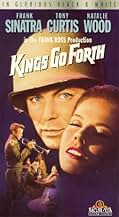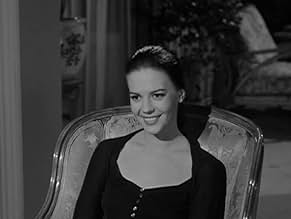Gegen Ende des Zweiten Weltkriegs gehen zwei amerikanische Soldaten, die in Südfrankreich kämpfen, eine Liebesbeziehung mit einer jungen Amerikanerin ein. Ihr Hintergrund wird mehr über die ... Alles lesenGegen Ende des Zweiten Weltkriegs gehen zwei amerikanische Soldaten, die in Südfrankreich kämpfen, eine Liebesbeziehung mit einer jungen Amerikanerin ein. Ihr Hintergrund wird mehr über die beiden als sie selbst verraten.Gegen Ende des Zweiten Weltkriegs gehen zwei amerikanische Soldaten, die in Südfrankreich kämpfen, eine Liebesbeziehung mit einer jungen Amerikanerin ein. Ihr Hintergrund wird mehr über die beiden als sie selbst verraten.
- Regie
- Drehbuch
- Hauptbesetzung
- Cpl. Lindsay
- (as Edward Ryder)
- Jazz Musician: Trumpet
- (Nicht genannt)
- Blairs' Butler
- (Nicht genannt)
- Old Frenchwoman with Wine
- (Nicht genannt)
- Jazz Musician: Tenor Sax
- (Nicht genannt)
- Jazz Musician: Drums
- (Nicht genannt)
- Jazz Musician: Vibraphone
- (Nicht genannt)
- Captain Harrison
- (Nicht genannt)
- Jazz Musician: Guitar
- (Nicht genannt)
- Jazz Musician: Bass
- (Nicht genannt)
Empfohlene Bewertungen
Tony Curtis’ part as the smooth-talking but put-upon charmer is effectively an extension of his Sidney Falco in Alexander Mackendrick’s SWEET SMELL OF SUCCESS (1957). The female roles are equally well filled: a lovely 19-year old Natalie Wood plays a young mulatto American raised in France who comes between Army “buddies” Sinatra and Curtis, while 35-year old Leora Dana is cast as Wood’s proud middle-aged mother (she must have quite impressed Sinatra because she was in SOME CAME RUNNING too – as Arthur Kennedy’s wife).
The film – backed by a fine score from Elmer Bernstein and including a jam session featuring Curtis and real-life jazz musicians – is well enough made scene by scene and certainly well acted, but the effect is slightly diluted by the unnecessary and ultra-soapy coda (Sinatra losing an arm, Dana dying, Wood gathering together and teaching war orphans – but especially the corny children’ song at the very end). The film is much more of a romantic melodrama than it is a war movie, but the few action sequences therein are good and well spread out throughout the film.
Delmer Daves may have been best renowned for his Westerns – but his very first shot as a director had actually come via a war movie, DESTINATION TOKYO (1943), and he eventually returned to the same territory intermittently with PRIDE OF THE MARINES (1945), TASK FORCE (1949) and, finally, KINGS GO FORTH itself.
The movie is narrated, at times, by Frank Sinatra and is told from the viewpoint of his character, Sam. Sam is in charge of a unit of soldier and when they are in France, he falls hard for a gorgeous French lady (Natalie Wood). Unfortunately, this is not reciprocated as although Sam is very nice, she only sees him as a friend. Unfortunately for her, however, she soon falls for Britt (Tony Curtis)...and Britt is a grade-A heel and only is interested in using this sweet girl.
This is a very good film. However, you really wonder how much better it might have been if the studio had been brave and cast the black actress, Dorothy Dandridge in the lead (as they originally intended). I am NOT complaining about Miss Wood's performance...she was EXCELLENT as a French woman. But the idea of having an obvious interracial romance would have made the film much more interesting and brave. As it is, Wood is supposed to be biracial but she really doesn't look it...and the film loses some of its punch. But it's still a good film and well worth your time...just not quite what it could have been. Sinatra is great in the movie, by the way...really, really good. And, Curtis plays an excellent fast- talking heel. Well written and unforgettable.
I thought Natalie Wood and Tony Curtis were just great in this movie, as was Leora Dana as Natalie's mother. Wood never received her due as an actress and I thought her French accent was just fine. Curtis is absolutely chilling in his confrontation with Dana and Wood and it is easy to understand why Sinatra would want to kill Curtis. I think Sinatra is somewhat miscast as the "ugly duckling" who pines for Wood. After all, we've all seen too many movies where Sinatra's won the hearts of girls as pretty as Wood (if there ARE any other girls as pretty as Wood). Watching the film again, I couldn't help but wonder what Charles Bronson could have done with Sinatra's role. Nonetheless, given the potentially explosive (at that time) interracial element, it is unlikely "Kings Go Forth" would have been made without Sinatra's participation. Further, the episodic structure of "Kings Go Forth" plays against the sexual tension of a love triangle. Finally, the ending is almost annoyingly noncommittal. It shouldn't be; after all, there are enough clues as to what should eventually transpire between the principals. I think, here, the problem continues to be Sinatra. He is simply too aloof and passionless.
Given my criticisms, you may be surprised to know I really like "Kings Go Forth." I give it a "7". Oh, and for the record, the French ARE, historically, a VERY racially tolerant people. Witness "Cajuns," the French and Indian War, Josephene Baker and their acceptance of Indo-Chinese Eurasian children.
Wusstest du schon
- WissenswertesThe role of Monique was originally written with Dorothy Dandridge in mind.
- PatzerCameraderie between Sam (an officer) and Britt (an enlisted NCO whose rank goes up and down as the story unfolds), is unmilitary and unreal, particularly their calling each other by their first names.
- Zitate
1st Lt. Sam Loggins: How do you feel about riding in a jeep?
Mrs. Blair: It's one of the several experiences I promised myself before I die. Another is jumping out of a parachute.
1st Lt. Sam Loggins: No, dear. You jump out of a plane. You hold onto the parachute.
- VerbindungenReferenced in In Person (1993)
Top-Auswahl
- How long is Kings Go Forth?Powered by Alexa
Details
- Erscheinungsdatum
- Herkunftsland
- Sprachen
- Auch bekannt als
- Kings Go Forth
- Drehorte
- Produktionsfirmen
- Weitere beteiligte Unternehmen bei IMDbPro anzeigen
- Laufzeit1 Stunde 49 Minuten
- Farbe
- Seitenverhältnis
- 1.85 : 1
Zu dieser Seite beitragen

































